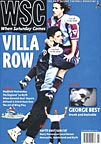 England peaked in 1966, not four years later, as is often believed, says David Montrose
England peaked in 1966, not four years later, as is often believed, says David Montrose
It’s the view put forward in the official history of the England team. It’s what Geoff Hurst thinks. Sir Alf himself supposedly believed it, though I’ve never discovered when and where he said so. And, of course, it’s been the opinion of assorted scribblers. Joe Lovejoy of the Sunday Times, for one, whose contribution to the pre-millennial surfeit of list-making was his assessment of the Greatest Football Teams. Occupying the top five slots, a genuine celebrity parade: Brazil 1970; Real Madrid 1960; Ajax 1972; Brazil 1958; Hungary 1953. Then, England 1970 – outranking the boys of ’66 as well as every team produced by Germany, the Netherlands, Argentina, Italy and France. Praise indeed for a side that lost two out of four.
Comparing teams from different periods is always problematic, but the small time gap makes a comparison between 1966 and 1970 easier. And, in six cases, the players are the same. Of those, only Gordon Banks and Alan Ball were better in 1970. Bobby Moore had a fine tournament, the Brazil game especially, but was on the way down from his commanding heyday, even if the decline was as yet inconspicuous. Not so Geoff Hurst and Bobby Charlton. Hurst had certainly come on after 1966. By 1970, though, he had been heading downhill for at least a year, while Charlton, inspirational no longer, had been past his best for twice that. The case of Martin Peters is trickier. He had also developed after The Win, but showed lacklustre form at West Ham during 1969-70, with England performances to match. A transfer to Tottenham in March revived his game only for spell. Notwithstanding a trademark far-post goal against West Germany, he was below par in Mexico.
Nobody who replaced a 1966 player raised the standard. Keith Newton, a solid Warren Barton type, never threatened to unseat George Cohen before injury finished the Fulham man’s career. Cyril Knowles, Tommy Wright, Paul Reaney and Emlyn Hughes were all tried in his spot and later events suggest that, with Mexico nearing, Ramsey settled on Newton as the most experienced of several unsatisfying options.
Brian Labone, capped in Walter Winterbottom’s last two games, was discarded after Ramsey’s calamitous first (the 5-2 defeat in France). First Maurice Norman then Jack Charlton took the job of doing Bobby Moore’s heading. Labone finally supplanted Charlton, not because his own game blossomed, but because Charlton’s withered. Even then Ramsey seemed unconvinced, recalling Big Jack several times. At left-back, no contest. Ray Wilson, another injury victim, had been world class. Terry Cooper, for all his verve going forward, was not.
Comparing Nobby Stiles and Alan Mullery is less straightforward. Stiles was an auxiliary defender, filling what became known as the holding role, while Mullery was allowed to push up more. Stiles would never have scored the goal Mullery did against West Germany (his only goal, mind you, in 35 appearances). Then again, Mullery would never have adhered to Eusébio as Stiles did in the 1966 semi. Call it even.
Lastly, Roger Hunt and Francis Lee. Lee may have been spectacular, but Hunt surpassed him as finisher and team player. For proof of Ramsey’s esteem, remember that in 1966 it was always a question of who – Hurst or Greaves – would partner Hunt. Leaving him out to accommodate both of them was never on the cards.
Teams can be more than the sum of their parts. Was the 1970 side superior as a unit? Ramsey’s behaviour says not. Having at last found his best XI in 1966, he stuck with them until injuries and the hourglass forced changes. Of his first-choice side in 1970, three were never capped again – Newton, Labone and Bobby Charlton. Mullery didn’t last much longer. Why dismantle a great side so quickly? Unless…
The myth of England ’70 rests firstly on the close thing against Brazil, allegedly the greatest team ever, when Lee and Astle missed juicy chances and Ball hit the bar. Well, all Brazil’s opponents had chances, but England alone omitted to take at least one. Romania also lost narrowly, 3-2. Also great? Second, there’s that nasty reverse in León, for which Peter Bonetti got all the blame. Yes, Beckenbauer’s goal was his fault, but Seeler’s and Muller’s were down to poor marking and ball-watching by the vaunted defence.
In 1970 England played admirably against two fine teams, though Brazil were inferior to the 1958 winners and West Germany to their 1972 European champions. But Ramsey’s men still lost twice. Their only victories were scrappy one-nils over Romania and Czechoslovakia. In 1958 England drew 0-0 with Brazil and were unlucky to go out against the Soviet Union. And nobody’s calling that team great.
From WSC 159 May 2000. What was happening this month